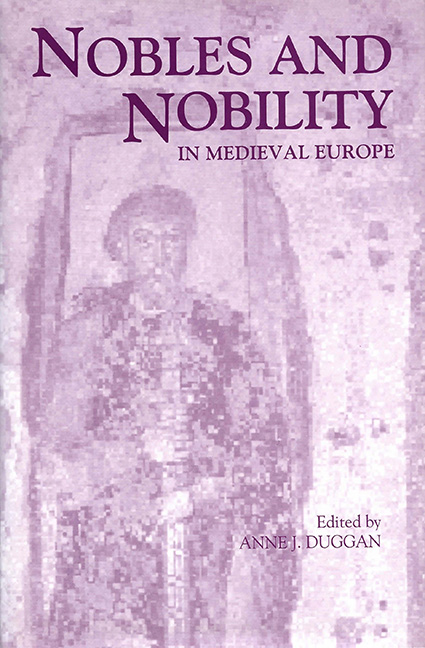 Nobles and Nobility in Medieval Europe
Nobles and Nobility in Medieval Europe Book contents
- Frontmatter
- Contents
- List of Illustrations
- Contributors
- Abbreviations
- Preface
- Dedication
- Introduction: Concepts, Origins, Transformations
- I Early Middle Ages
- II Central Middle Ages
- 7 Princely Nobility in an Age of Ambition (c. 1050–1150)
- 8 Words, Concepts, and Phenomena: Knighthood, Lordship, and the Early Polish Nobility, c. 1100 – c. 1350
- 9 Nobles and Nobility in the Narrative Works of Hartmann von Aue
- 10 A Noble in Politics: Roger Mortimer in the Period of Baronial Reform and Rebellion, 1258–1265
- 11 King Magnus and his Liegemen's ‘Hirdskrå’: A Portrait of the Norwegian Nobility in the 1270s
- III Late Middle Ages
- Index
9 - Nobles and Nobility in the Narrative Works of Hartmann von Aue
from II - Central Middle Ages
Published online by Cambridge University Press: 25 October 2017
- Frontmatter
- Contents
- List of Illustrations
- Contributors
- Abbreviations
- Preface
- Dedication
- Introduction: Concepts, Origins, Transformations
- I Early Middle Ages
- II Central Middle Ages
- 7 Princely Nobility in an Age of Ambition (c. 1050–1150)
- 8 Words, Concepts, and Phenomena: Knighthood, Lordship, and the Early Polish Nobility, c. 1100 – c. 1350
- 9 Nobles and Nobility in the Narrative Works of Hartmann von Aue
- 10 A Noble in Politics: Roger Mortimer in the Period of Baronial Reform and Rebellion, 1258–1265
- 11 King Magnus and his Liegemen's ‘Hirdskrå’: A Portrait of the Norwegian Nobility in the 1270s
- III Late Middle Ages
- Index
Summary
Hartmann von Aue
Hartmann von Aue occupies a position of signal importance in the history of German literature, being the earliest in that group of narrative poets, which includes also Wolfram von Eschenbach, Gottfried von Straßburg, and the poet of the Nibelungenlied, whose works, together with outstanding achievements in the lyric, have led to the years from c. 1180 to c. 1230 being regarded as the classical period of German literature in the Middle Ages. In a development which can be traced back to the middle of the twelfth century, the Church's monopoly of literature in the vernacular was emphatically broken at this time, and lay society in the form of the secular aristocracy found its own distinctive literary voice in the poetry of the classical period. Though profoundly indebted in many ways, both practically and intellectually, to the literate culture of the clerics, the vernacular literature of Hartmann and his fellows was a literature written for and largely about the secular nobility, reflecting its chivalric and courtly character. It is symptomatic of the change in the domain of letters at this time that in Hartmann we have the first narrative poet in German who identifies himself as a knight.
Hartmann was the author of a substantial number of lyrics and of a didactic poem, Die Klage, which treats the theme of love in the form of a dialogue between the body and the heart, but the high regard in which he was held by poets in the Middle Ages and continues to be held today by students of literature rests principally on his four narrative works: the chivalric romances, Erec and Iwein, which are the earliest examples of Arthurian romance in German, and two shorter poems of religious character, Gregorius and Der arme Heinrich. None of these works can be dated precisely, but it is generally accepted that they were composed – in the order Erec, Gregorius, Der arme Heinrich, Iwein – in the first half of the classical period, that is, from c. 1180 to c. 1205. It is with aspects of these four works that the present essay will be concerned.
- Type
- Chapter
- Information
- Nobles and Nobility in Medieval EuropeConcepts, Origins, Transformations (King's College London 1998), pp. 157 - 182Publisher: Boydell & BrewerPrint publication year: 2000


